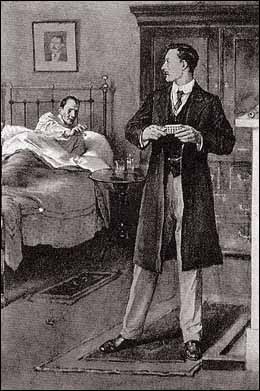 Recently on my Twitter feed, I finished parceling out "The Adventure of the Six Napoleons," in 140 character installments. A story story becomes awfully long that way, I won't lie, but it turned out to be a surprisingly fun project. So I'm doing it again.
Recently on my Twitter feed, I finished parceling out "The Adventure of the Six Napoleons," in 140 character installments. A story story becomes awfully long that way, I won't lie, but it turned out to be a surprisingly fun project. So I'm doing it again.Check out my Twitter feed for a daily installment, though I can sometimes be inspired to post more than once a day. And don't forget that you can read through the original canon stories online.
oOo
Less than two weeks left to enter my contest. There's some excellent reading material, and a little bit of music up for grabs (all related to Sherlock Holmes, of course).

As I tweeted, I love DYIN. It shows the terrifying lengths Holmes will go to solve a crime and get his man, and the box is a truly creepy device (far more subtle than anthrax in an envelope, no?)
ReplyDeleteAs I recently read the canon, I found myself flinching at the racial slurs. Now, I have a lit background, and I am not a fan of changing the language of original texts to be more sensitive (a la the recent Huck Finn brou-ha-ha.) I understand that such language was (unfortunately) just common then and it's as much a part of historical writing as anything else. Nonetheless, hearing those terms from Holmes's mouth always gave me a jolt and made me feel a little queasy. Interestingly, it seemed to me Conan Doyle used these terms more frequently in the late stories. What do you think?
@2000irises: Something about unidentified packages really hits my fear center, so that is definitely why I love DYIN.
ReplyDeleteAnd I have to agree with you about the racial slurs--it's hard not to flinch, but that's what is so interesting about language, I think...how changes and adapts over time. Language and how it was used (in *all* ways) puts as much of stamp on a time period as anything else an anthropologist can dig up. I think it is very unwise to go back and "edit" literature because the language used in the text provides context for what we do and do not know, no matter how we may feel about it under the scrutiny of our modern lens. That said, I have a literature background too, but I wouldn't say I'm any kind of expert on this particular subject, so I love to hear all types of views on this.